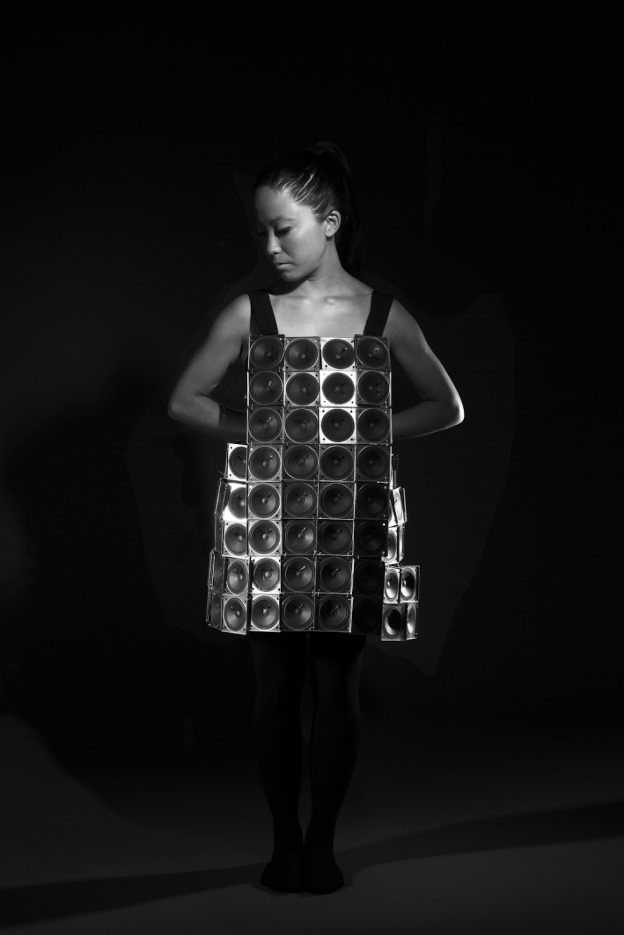American Composers Orchestra Continues 40th Anniversary Season
Reflected in Glass: Philip Glass and the Next Generation
Friday, December 8, 2017 at 7:30pm
Music by Philip Glass, Pauchi Sasaki, and Bryce Dessner
Featuring George Manahan, ACO Music Director;
Pauchi Sasaki, Electronics & Speaker Dress; and Tim Fain, Violin
Zankel Hall at Carnegie Hall | 57th St. and 7th Ave. | NYC
Tickets: $41 & 51 at www.carnegiehall.org, 212-247-7800, or the Carnegie Hall Box Office (154 West 57th Street, NYC)
American Composers Orchestra (ACO) continues its 2017-2018 season, under the leadership of Artistic Director Derek Bermel, Music Director George Manahan, and President Edward Yim, with Reflected in Glass: Philip Glass and the Next Generation, on Friday, December 8, 2017 at 7:30pm at Carnegie Hall’s Zankel Hall (57th St. and 7th Ave.). Reflected in Glass is Philip Glass’ first concert as Carnegie Hall’s Richard and Barbara Debs Composer’s Chair, which he holds for the 2017-2018 season.
The concert features Glass’ Violin Concerto No. 2, “The American Four Seasons,” with Tim Fain as soloist. Glass’ work is paired with two composers he has mentored and inspired – Pauchi Sasaki and Bryce Dessner. Dessner’s Réponse Lutosławski, which receives its New York premiere in this performance, is the creative fruit of his study of Lutosławski’s string orchestra piece Musique funèbre. Pauchi Sasaki’s GAMA XVI, co-commissioned by ACO and Carnegie Hall, features the composer as electronics soloist, wearing and performing an original Speaker Dress made from 100 speakers.
The performance ends with a rare behind-the-scenes conversation between Glass and Sasaki, whose collaboration was formally supported by the Rolex Mentor and Protégé Arts Initiative. Moderated by Provost and Dean of The Juilliard School Ara Guzelimian, they will discuss their close working relationship and the mentorship experience. Glass and Sasaki’s work with American Composers Orchestra this season is made possible by the Rolex Institute.
Reflected in Glass Concert Program:
PAUCHI SASAKI: GAMA XVI for Orchestra and Speaker Dress with composer as electronics soloist (2017, World Premiere, ACO/Carnegie Hall Commission)
BRYCE DESSNER: Réponse Lutosławski (2014, New York Premiere)
PHILIP GLASS: Violin Concerto No. 2, “American Four Seasons” (2009)
Conversation with Philip Glass and Pauchi Sasaki, moderated by Juilliard Provost and Dean Ara Guzelimian
ACO’s 2017-2018 season, Dreamscapes, features ten world, U.S., and New York premieres by a diverse set of composers. ACO continues its concerts at Carnegie Hall’s Zankel Hall (December 8, 2017 and April 6, 2018) while expanding its presence in New York to include the 40th Birthday Concert at Jazz at Lincoln Center (November 7, 2017) and as part of the 2018 PROTOTYPE Festival (January 12-14, 2018) in Gregory Spears and Greg Pierce’s Fellow Travelers. ACO continues to take its commitment to fostering new work beyond the stage in its annual Underwood New Music Readings (June 21 and 22, 2018) for emerging composers, now in its 27th year, and through EarShot, the National Orchestra Composition Discovery Network, which brings the Readings experience to orchestras across the country. In addition, this season ACO launches its Commission Club, through which members invest in the lifespan of a commission: from the composer’s first kernel of artistic inspiration to the realization of the music as a printed score, the early rehearsals, and through the premiere performance. In its inaugural season, ACO’s Commission Club will support The Bad Plus founding member, composer, and pianist Ethan Iverson as he creates his first orchestral work, Concerto to Scale, which he will perform with ACO on Friday, April 6, 2018 at Zankel Hall at Carnegie Hall.
In 2017-2018, ACO celebrates 40 years as the only orchestra in the world wholly dedicated to the creation, performance, preservation, and promotion of music by American composers. To date, ACO has performed music by 800 American composers, including 350 world premieres and newly commissioned works. This season explores the overarching theme of dreams as an inspiration for both music itself and community created through music – celebrating ACO co-founder Francis Thorne’s dream of an orchestra to champion the American composer; iconic composer Philip Glass’ dream for the next generation; and the American dream of inclusiveness reflected in the infinite ways American orchestral music illustrates geographic, stylistic, gender, and racial diversity.
About the Music
Philip Glass is widely regarded as one of the most influential musicians of our time. In the early 1960s, following studies at the University of Chicago and The Juilliard School, Glass spent two years of intensive study in Paris with Nadia Boulanger and while there, earned money by transcribing Ravi Shankar’s Indian music into Western notation. By 1974, Glass had a number of innovative projects, creating a large collection of new music for The Philip Glass Ensemble and for the Mabou Mines Theater Company. This period culminated in Music in Twelve Parts, and Einstein on the Beach on which he collaborated with Robert Wilson. Since Einstein, Glass has expanded his repertoire to include music for opera, dance, theater, chamber ensemble, orchestra, and film. ACO has a long history of performing Glass’ work frequently, going back to the world premiere of his first violin concerto written for the late Paul Zukofsky in 1987. ACO recorded Glass’ Heroes symphony in 1997 and most recently gave the U.S. premiere of his Symphony No. 9 at Carnegie Hall on Glass’ 75th
birthday in 2012. Glass’ Violin Concerto No. 2 was written for violinist Robert McDuffie in 2009. The work, which will be performed by ACO with soloist Tim Fain, is a companion piece to Vivaldi’s The Four Seasons, but Glass states in the note for the piece that he and McDuffie did not agree on which movement corresponded to which season. He writes, “This struck me as an opportunity, then, for the listener to make his/her own interpretation. Therefore, there will be no instructions for the audience, no clues as to where Spring, Summer, Winter, and Fall might appear in the new concerto – an interesting, though not worrisome, problem for the listener.”
Pauchi Sasaki’s interdisciplinary approach integrates musical composition with the design of multimedia performances and the application of new technologies. A composer, performer, and improviser, she collaborates actively on projects linked to film, dance, theater, installation, site specific, and interdisciplinary performances. Sasaki has performed internationally in Peru, the U.S., Japan, Spain, Chile, Colombia, and Switzerland. In 2016, she was selected by Philip Glass to become his protégé as part of the Rolex Mentor and Protégé Initiative for a one-year mentorship. Her compositions involve acoustic, amplified, and electronic instrumentation influenced by improvisational aesthetics and ethnic musical traditions. Her work also focuses on the development of real time interactive music and self-designed instruments using Max Msp and circuit bending. This branch of her work seeks the embodiment of electronic music performance integrating the emission of electronic sounds with corporal expressivity. Sasaki’s classical violin studies began at age five; she studied Andean music at CEMDUC; classical music of North India with maestro Ali Akbar Khan in San Rafael, California; and Klezmer music with Alicia Svigals in New York. She studied with composers César Bolaños, Maggi Payne, John Bischoff, Fred Frith, Chris Brown, James Fei, Les Stuck, Laetitia Sonami, and Pauline Oliveros. Sasaki holds a bachelor’s degree in Journalism from PUCP in Lima and a master’s degree in Recording Media and Experimental Music from Mills College in Oakland, California. An active film scorer, her music is featured in more than 30 feature and short films, and she has been honored with awards from the Festival de Cinema Latino Americano di Trieste; the International Latin American Film Festival of Lima; CONACINE, the National Film Council of Peru; the Paul Merritt Henry Prize; and Goethe-Institut’s artist residency in Brazil, among many others. Her current project GAMA has been presented at the Tokyo Experimental Festival, The Mario Testino Museum, Art Basel Miami, Lincoln Center’s Mostly Mozart, The Kitchen, and Grand National Theater, among others. Sasaki’s piece for ACO, GAMA XVI, is a performative electroacoustic composition for orchestra and speaker dress – a wearable sound sculpture created with 100 speakers. Of the piece, Sasaki says, “In GAMA XVI, the string orchestra describes a space that is constantly changing its shape, a place that breathes and is alive. This image is reinforced by the quadraphonic spatialization of pre-recorded electronics and the movement of the Speaker Dress throughout the performance space. The morphing behavior is described by the oscillation between the parameters of pressure and looseness, harmony and dissonance, discontinuity and rhythm, timid whispers – fainting with the glissandos – and strong affirmations and releases of sound. There is an underlying will, a constant search for movement.” Photo of Pauchi Sasaki and Speaker Dress: Juan Pablo Aragon
Bryce Dessner is one of the most sought-after composers of his generation, with a rapidly expanding catalog of works commissioned by leading ensembles. Known to many as a guitarist with The National, he is also active as a curator – a vital force in the flourishing realm of new creative music. His orchestral, chamber, and vocal compositions have been commissioned by the Los Angeles Philharmonic, Ensemble Intercontemporain, Metropolitan Museum of Art (for the New York Philharmonic), Kronos Quartet, BAM Next Wave Festival, Barbican Centre, Edinburgh International Festival, Sydney Festival, eighth blackbird, So Percussion, New York City Ballet, and many others. He has curated Mountains and Waves at the Barbican, and founded MusicNOW in Cincinnati. Dessner now resides in Paris and has been increasingly active composing for major European ensembles and soloists. Last fall he premiered a new piece entitled Wires commissioned for Ensemble Intercontemporain and Matthias Pintscher, as well as recent solo works for violinists Pekka Kuusisto and Jennifer Koh, and a concerto for renowned pianists Katia and Marielle Labeque. Dessner’s Réponse Lutosławski was written as an homage to Witold Lutosławskı͛ ’s composition for string orchestra, Musique funèbre. “This was an amazing process of discovering one of the 20th century’s great musical minds and allowing his adventurous spirit to influence my own musical decisions,” Dessner says. “I like to think that his music opened a window in a certain direction for me, or pushed open a door, through which I could then pass and take my journey with the music.”


